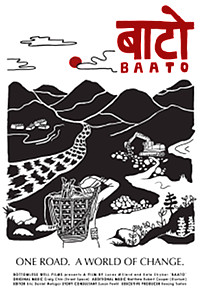| SHADOWS ON THE WALL | REVIEWS | NEWS | FESTIVAL | AWARDS | Q&A | ABOUT | TALKBACK | |||||||||||||||||||||||||||||
 Shadows off the beaten path Shadows off the beaten pathIndies, foreign, docs and shorts...
On this page:
BAATO |
KOKOMO CITY |
A LIFE ON THE FARM
| |||||||||||||||||||||||||||||
| See also: SHADOWS FILM FESTIVAL | Last update 4.Sep.23 | |||||||||||||||||||||||||||||
|
Baato Review by Rich Cline | 
Now streaming...
| 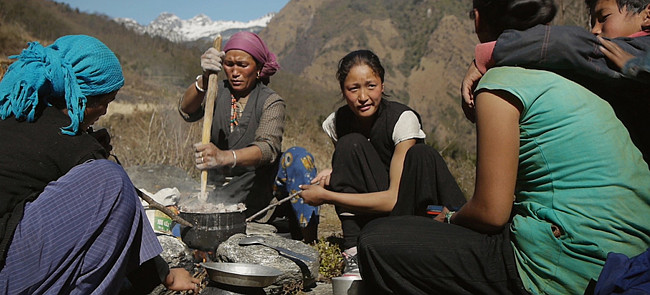 Skilfully filmed in breathtaking locations in the Himalayas, this documentary explores the impact of progress on a centuries-old way of life. Shot fly-on-the-wall style, the film allows us to experience both this fascinating tradition and the impact of change. It's beautifully observational, catching wonderful details of daily life along with the sparky personalities of the people on-screen as they make their annual migration. But traditions are shifting dramatically. In Nepal's upper Arun Valley, Mikma and her family have travelled south by foot each winter for generations to sell medicinal plants in city markets, fuelling their village's annual economy. Their 300-km (185-mile) kavela takes more than a week on steep trails that snake along the mountain slopes. But near the border of Tibet, they encounter a crew excavating the hillside to build a new highway to China. As sections of it are completed, bus travel is changing the way people get around. And this road is also wiping out people's land and homes. Directors Millard and Stryker also carried the cameras, following as Mikma sets off on her annual trek a party of about 8, from young children to grandparents, accompanied by a tiny new puppy. Their playful interaction is a joy to watch. Other family members have moved to the city in search of jobs and entertainment. The footage includes small events from meals, bathing and playing games to more momentous events, such as a tense struggle to coax cattle across a high suspension bridge. It's fascinating to hear these people talking about the medicines they are carrying, from the key ingredient of paracetamol to some illicit ones they need to smuggle secretly. Other items they can only carry as gifts, but not for sale, and there are discussions about permits and taxes. The women carry especially enormous loads on their backs, so it's understandable when they get a chance to take a bus get a lift in a truck. Along the way, the cameras also observe the people this family encounters, including city dwellers, those travelling by road and the construction crews, which often include local workers. Mikma's family jokes about the changing modes of transportation, laughing that at this rate the road won't be finished until after they die. And maybe one day they'll make the journey by helicopter. The point is made quietly that life in this remote valley can't escape the advance of progress for long, and nothing will never be the same here.
|
| Kokomo City Review by Rich Cline | 
| 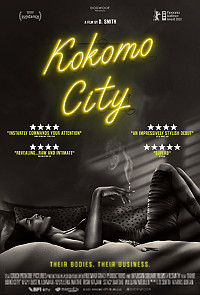 dir D Smith prd D Smith, Harris Doran, Bill Butler with Daniella Carter, Dominique Silver, Koko Da Doll, Liyah Mitchell, Rich-Paris, XoTommy, Michael Carlos Jones, Lennox Love, INW Tarxan, Lexx Pharaoh, Bebe Smith, Stacy Barthe release US Jan.23 sff, UK 4.Aug.23 23/US 1h13 SUNDANCE FILM FEST BERLIN FILM FEST  Now streaming...
| 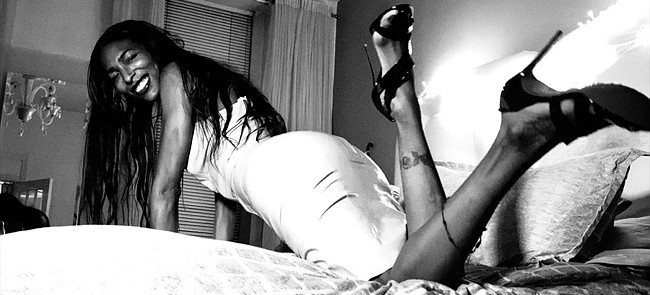 With black and white handheld camerawork and a briskly comical tone, this documentary brings the viewer into the lives of four Black trans street workers. Bursting with sex positivity, their anecdotes are hugely entertaining. They also reveal deeper truths that shed new light on wider culture and the nature of masculinity. It's a raw and often brutally honest film, and the frank approach makes it both entertaining and moving. Struggling to make ends meet while facing huge medical bills, these women turned to prostitution, and their clients are usually men who are living double live. Most of these men like pretty girls with male genitalia, which means that these women need to have surgical procedures to make them look more feminine. Indeed, life is better for them if they can pass as female in public. As part of Black, gay, trans and sex worker communities, they have experienced horrible prejudice from all sides. But they still have dreams of their own. Director D Smith shoots the film with an artist's eye, catching interviews from offbeat angles that draw out larger-than-life personalities, as if these women are sharing stories they shouldn't. Cutaways include witty re-enactments, conversations with fast-talking clients and gorgeous dance movements. Each of them is outspoken about both their profession and the world they live in, under no illusion that what they are doing is about anything other than survival. And a lot of girls don't make it out. These women observe that the men who date them are the kinds of guys who are looking for a way to express themselves more openly than society allows. This helps balance the fact that they are involved with Black men who are cheating on Black wives. But then they don't understand why everyone is so fascinated about who is sleeping with whom. They struggle to maintain their identity apart from men, but they are finding their voices. And they know this topic far better than most. What these women know is that far more men are repressed homosexuals than anyone expects. And trans hookers offer sex that doesn't violate the rules of Black masculinity, letting them convince themselves that they're not gay while perpetuating a sexist subculture. So the men who are able to open up and talk about this feel almost shockingly open-minded. In other words, pretty much everyone in this film is helping to shatter stereotypes about Black sexuality and gender.
|
| A Life on the Farm Review by Rich Cline | 
| 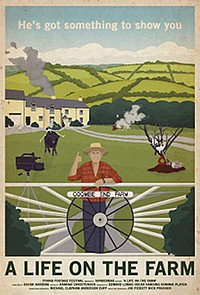 dir Oscar Harding prd David Lee Hawkins, Oscar Harding, Edward Lomas, Dominik Platen with Charles Carson, Oscar Harding, Koo Stark, Derrick Beckles, Karen Kilgariff, Joe Pickett, Nick Prueher, Jake Day-Williams, Robert Hull, Davy Rothbart, Dimitri Simakis, Thomas Lynch release US 13.Apr.23, UK 8.Sep.23 22/UK 1h15 Now streaming...
| 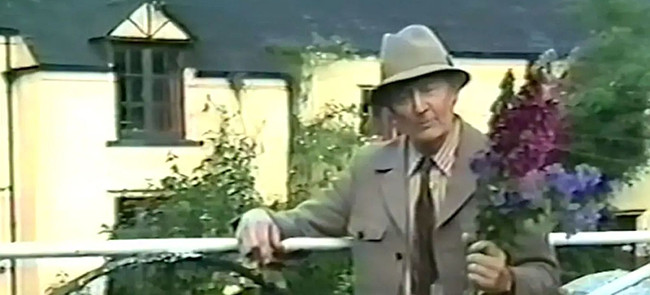 Jaunty and offbeat, this British documentary explores a bonkers home movie that has left collectors in jaw-dropping awe, leading to internet fame. Director-producer Oscar Harding has a connection with this videotape through his grandparents, so this is a personal journey for him. And he has assembled this into a gently involving narrative. So if the editing plays it up, and commentary is often obvious, it's still very charming. In the isolated Somerset village of Huish Champflower, Oscar finally watches a VHS tape that was found in his late grandfather's things. It features Charles Carson touring his neighbouring farm and birthing a pair of calves, like a quirky TV presenter. Then things get strange, starting with segments about the deaths of his beloved cats, as well as his mother and father. And scenes get increasingly offbeat and eccentric. So Oscar knew he needed to learn more. Then he finds another edit of the film featuring skeletons working the farm, plus a scripted short film. Along with footage from this now legendary movie, this doc features interviews with underground movie aficionados chattering like fans about the odd scenes Charles created. Indeed, Coombe End Farm is resolutely eccentric, with its cluttered rooms full of cats and chickens. Although she didn't live there, Charles' wife Helen makes a couple of brief appearances. Neighbours recount how, after his parents, brother and wife pass away, Charles slowly faded from view in the community, dying himself in 2008. Indeed, the neighbours' comments are much more interesting than the fan-style talking heads, as they piece Charles' story together with firsthand memories and personal observations. They trace the history of the family farm and the many years Charles spent as a teacher, returning in the mid-1980s to help his elderly parents. When he became interested in videography, he set out to document his life with attention to unusual details. And he was proud that his photos took first prize in a national competition. This is a fascinating look at a man who found an unusual outlet for his creativity, setting up photographs and captioning them like comic books, then orchestrating scenes for his delightfully surreal films. It's impossible to know how much of the oddities on tape were a result of his dementia. But Charles had a clear interest in the life cycle, from birth to death. And he spend his life giving bespoke versions of his movie to friends, knowing there was a larger audience for his work.
| 
See also: SHADOWS FILM FESTIVAL © 2023 by Rich Cline, Shadows
on the Wall
HOME | REVIEWS | NEWS | FESTIVAL | AWARDS
| Q&A | ABOUT | TALKBACK | | ||||||||||||||||||
